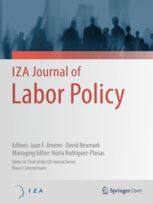
Fostering job search among older workers: the case for pension reform
Employment rates among senior workers (aged 55 or over) in southern Europe are among the lowest in OECD economies. Spain is a paradigmatic example, with high unemployment rates and very low workforce reentry rates for unemployed workers.
Poor demand is typically blamed for this problem, but the interaction of pension rules and unemployment insurance may also play an important role in this outcome. Generous unemployment benefits, lax search requirements for the unemployed and strong early retirement penalties imposed on “regular” retirees effectively create an alternative path to early retirement.
In this paper, we explore this alternative path quantitatively. We develop a model of job search and retirement behavior, calibrate it to the specificities of the Spanish case and verify its empirical validity in a large administrative dataset of employment histories. We then explore the effectiveness of pension reform in increasing the labor supply and overall welfare. We link early retirement penalties to the age at which an individual stops paying contributions. This reform removes the incentives to remain unemployed without searching and thus encourages individuals to either retire or actively engage in job seeking. The reform also leads to significant welfare losses, especially among the previously non-participating unemployed who are close to the early retirement age; however, the reform also raises sufficient additional resources that public authorities can use to compensate all affected workers.